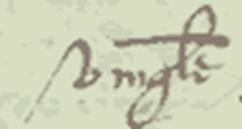If a word or a phrase in a document appears unintelligible or illegible, consider one of the following options:
Abbreviations
Marks of contraction or suspension
Abbreviations are commonplace today, for example, Mrs., Mr., Dr., Col., but before 1750 many more are found. These are the vestiges of a widespread medieval system of abbreviation. Clerks usually drew the reader's attention to abbreviations by making a mark of suspension or contraction.

umquhile is a common word used in testaments meaning deceased. In this example, the clerk has written vmqle with a tittle mark of contraction (a horizontal dash above the short letters m, q and e and through the ascender of the letter l ) to denote that letters are missing from the middle of the word. This would be transcribed as vmq[uhi]le.

This is the word Testament but the clerk has abbreviated it to Test and made a mark of suspension after the last letter. This would be transcribed as Test[ament].
'p' prefixes
Pay particular attention to words beginning with the letter p, which may be an abbreviation to signify certain prefixes or appear in the middle of a word:
A horizontal stroke through the descender of the letter p signifies the prefix per-, por- or par-.
A curl through the descender of the letter p signifies the prefix pro-.
A wavy line or backward curl running vertically upwards from the letter p signifies the prefix pre- or prae-.
Obsolete letters
Another form of abbreviation was to write a superscript letter, especially after the (now defunct) letter thorn which signifies the letters th:
The letter thorn
Thorn and a superscript e which is transcribed as the.
There is also the obsolete letter yogh which signifies the letter y.
The word yow which means you incorporating the letter yogh.
Further help
For further help with recognising and transcribing manuscript abbreviations, consult the Scottish Handwriting's guide on abbreviations, which includes additional examples. Consult our glossary for examples of common abbreviations and their meanings.
Dates
The word might not be a word but a date: between 1500 and 1800 dates were often begun in a strange form which began 'Jaj' .
Read our guide on dates, numbers and sums of money.
Interference
Look for interference from descending letters from the line above or ascending letters from the line below. Take these strokes into account by imagining them absent from the word you are reading.
Latin words
In the medieval period most documents were written in Latin and as time progressed into the sixteenth century and beyond the use of Latin words persisted until their use gradually declined. Latin is also used for legal terms and for common words and phrases, for example, summa meaning total appears in inventories.
Consult our glossary. If the word or phrase is not there, refer to a Latin word list, such as Eileen Gooder, 'Latin for Local History', London, 2nd. edition, 1978; and/or R. E. Latham, 'Revised Medieval Latin Word-list from British and Irish Sources', London, 1965.
Legal terms
The word might be legal jargon, for example, anent meaning concerning, on the subject of. Look at our glossary for legal terminology. Also recommended is Stephen O'Rourke, 'Glossary of Scottish Legal Terms', Edinburgh, 4th Edition, 2004.
Medical terms
The word or phrase might be a medical term, for example, blintrin meaning short sighted. Consult our glossary for medical terminology.
Occupations
View our glossary for a list of occupations, their definitions and variants, compiled from various sources including those taken directly from the index to wills and testaments.
Numbers and sums of money
The word may not be a word at all, but a number or sum of money or amount of agricultural produce written in Roman numerals, for example Cxiv = 114. Remember that a good way to spot numerals is when the last i is rendered as a j, for example, iij = 3.
See our guides on dates, numbers and sums of money and agricultural produce and livestock. Consult our glossary for weights, measures and money.
Phonetic spelling
If you are fairly certain of all the letters which make up the word, but you don't recognise the word, the first thing to consider is that the spelling is phonetic rather than the modern version of the word your eye is used to recognising.
Scots words
Alternatively the word might be a Scots word. The further back one goes the more Scots language one encounters. Common Scots words occurring are relict which means widow and compeared which means appeared before a court. Note also the Scots plural form -is, and the Scots past participle -it.
Said[is]

receavit
Consult the Dictionary of the Scots Language for help with Scots words.
Weights and measures
The word might be a weight or measure. Consult our guide on weights and measures and our glossary for weights, measures and money.
Further reading
For further help with palaeography consult our guide on reading older handwriting and visit the Scottish Handwriting resource, in particular the testaments tutorial and the palaeography posers organised by different record types.
Use the record guides to understand the form of documents such as valuation rolls and wills and testaments.